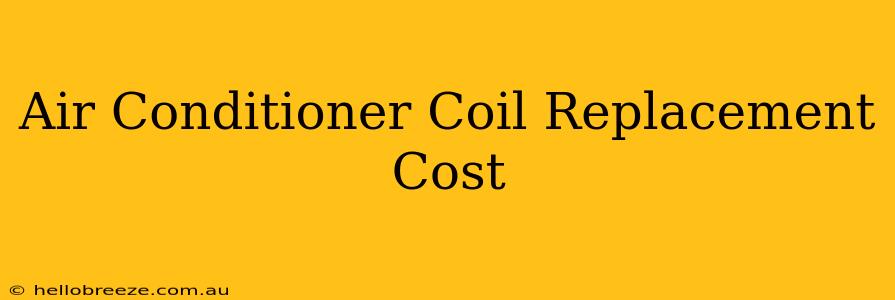Replacing your air conditioner's coil is a significant investment, but understanding the costs involved can help you budget effectively. This guide breaks down the factors influencing the price of an AC coil replacement and provides insights to help you make informed decisions.
Factors Affecting Air Conditioner Coil Replacement Cost
Several factors contribute to the overall cost of replacing your AC coil. These include:
1. Type of Coil:
- Evaporator Coil: This indoor coil absorbs heat from your home. Replacing it typically costs less than replacing the condenser coil.
- Condenser Coil: This outdoor coil releases heat from the refrigerant. Condenser coil replacements usually cost more due to their size and outdoor location.
- Both Coils: Replacing both coils simultaneously, if needed, significantly increases the total cost. This is often the most cost-effective approach in the long run if both coils are nearing the end of their lifespan.
2. AC System Size and Type:
Larger AC systems require larger coils, which naturally increases the cost of replacement. The type of system (central air, heat pump, window unit) also impacts pricing. Central air systems typically have higher replacement costs due to the larger coil sizes and more complex installation.
3. Coil Material and Brand:
Coils are made from various materials, including copper and aluminum. Copper coils are generally more expensive but offer superior durability and efficiency. The brand of the coil also affects pricing, with premium brands often costing more.
4. Labor Costs:
Labor costs are a substantial portion of the total expense. Factors influencing labor costs include your location (labor rates vary by region), the complexity of the installation, and the HVAC technician's experience and expertise. Finding a reputable, licensed HVAC technician is crucial to ensure proper installation and avoid future problems.
5. Refrigerant:
The type and amount of refrigerant required can impact the overall cost. Refrigerant is a critical component of your AC system, and its cost can vary depending on market conditions. This is an additional expense separate from the coil itself.
6. Additional Repairs or Replacements:
During the coil replacement process, your HVAC technician might discover other issues requiring attention. This could include replacing other components, like the blower motor or compressor, leading to unexpected additional expenses. Regular maintenance can help minimize the likelihood of such unexpected repairs.
Average Cost Ranges for Air Conditioner Coil Replacement
Providing an exact cost is difficult without a specific assessment, but here's a general idea:
- Evaporator Coil Replacement: $500 - $1500 (including parts and labor)
- Condenser Coil Replacement: $800 - $2500 (including parts and labor)
- Both Coils Replacement: $1300 - $4000+ (including parts and labor)
These are estimates only. It’s always recommended to obtain multiple quotes from reputable HVAC contractors in your area for accurate pricing tailored to your specific needs.
Tips for Saving Money on AC Coil Replacement
- Regular Maintenance: Regular AC maintenance can extend the lifespan of your coils and prevent premature failure, saving you money in the long run.
- Shop Around for Quotes: Compare quotes from several HVAC contractors to secure the best pricing and service.
- Consider Seasonal Discounts: Some contractors offer discounts during the off-season (fall and winter).
- DIY (Caution!): While replacing an AC coil yourself might seem like a cost-saving option, it's generally not recommended unless you have extensive HVAC experience. Incorrect installation can lead to serious problems and potentially void your warranty.
Conclusion:
Replacing your air conditioner's coil is a significant investment, but understanding the influencing factors can help you budget effectively and make informed decisions. Always obtain multiple quotes, prioritize quality over low price, and remember that regular maintenance is key to extending the lifespan of your AC system. Prioritizing professional installation ensures the longevity and efficiency of your cooling system.

